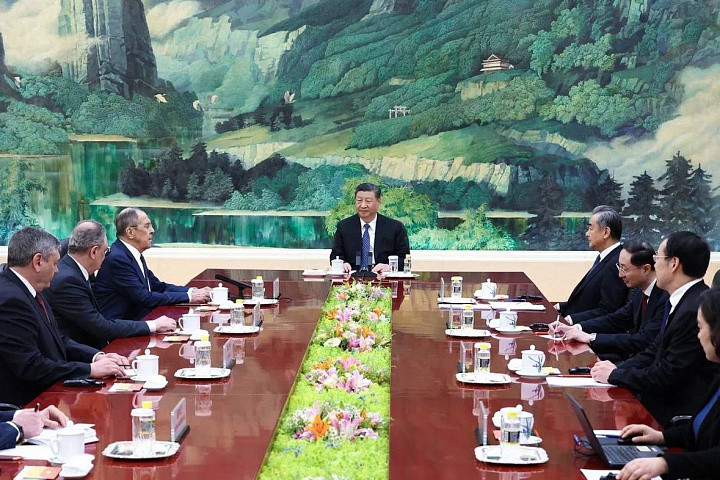China and Russia have agreed to strengthen their strategic cooperation and provide each other with "strong support" in the face of what they perceive as Western pressure and sanctions, according to statements made during a meeting between Chinese Foreign Minister Wang Yi and his Russian counterpart, Sergey Lavrov, in Beijing on Tuesday.
Lavrov, who is on a two-day visit to China, said that Moscow and Beijing would launch a "dialogue" on Eurasian security issues, as proposed by Russian President Vladimir Putin, to counter the influence of the United States and its Western allies in the region. "For a long time, there was a Euro-Atlantic security structure in the form of NATO, of course, as well as the OSCE, but it is striking itself out from the list of relevant structures within which it is possible to conduct meaningful negotiations and agree on something based on a balance of interests," Lavrov said, as reported by Russian news agencies.
Wang echoed Lavrov's sentiments, stating that the two countries should "oppose hegemonism and power politics, oppose the monopoly of international affairs by a few countries." He also warned against NATO extending its activities into the Asia-Pacific region.
The meeting between Wang and Lavrov comes amid increasing pressure from Western nations on China to use its influence to persuade Russia to end the war in Ukraine. The United States has warned Beijing against providing indirect aid to Russia, with Secretary of State Antony Blinken recently stating that "China continues to provide materials to support Russia's defense industrial base." During a visit to China on Monday, US Treasury Secretary Janet Yellen cautioned that there would be "significant consequences" for any Chinese companies supporting Russia's war effort in Ukraine.
Both Lavrov and Wang expressed their support for each other's leaders during the meeting, with the Chinese foreign minister praising "the strong leadership of President Putin" and pledging that "China will support Russia's stable development under the leadership of Putin." Lavrov reciprocated by expressing gratitude for China's support, noting that "Xi Jinping... was among the first ones to send congratulations to the president-elect Putin" after his reelection win last month.
The strengthening ties between China and Russia were further underscored by a meeting between Lavrov and Chinese leader Xi Jinping later on Tuesday. State media did not immediately release details of the meeting, but it is notable that heads of state do not necessarily meet with visiting ministers. The last meeting between Lavrov and Xi took place in 2018, just weeks before a state visit from Putin to China.
Since then, the two countries have significantly ramped up their economic, trade, and diplomatic relations, particularly in the wake of Putin's war in Ukraine. While Beijing claims neutrality in the conflict, it has emerged as a key economic lifeline for the isolated Russian economy and a staunch diplomatic partner for Moscow as both push back against perceived containment from the West.
During the joint news conference following their meeting, Wang and Lavrov discussed the war in Ukraine, agreeing that international meetings on the conflict that ignore Moscow's interests "are futile." Wang also expressed China's support for holding an international peace conference "recognized by both Russia and Ukraine," with "equal participation by all parties and where all peace plans are discussed fairly."
As questions continue to mount about how to end the war in Ukraine, the deepening partnership between China and Russia presents a significant challenge to Western efforts to isolate and pressure Moscow. The planned Eurasian security dialogue and the increasingly frequent high-level meetings between the two countries' leaders and top officials underscore their shared commitment to reshaping the global order in opposition to the United States and its allies.






